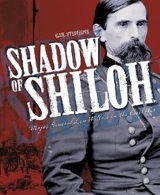Shadow of Shiloh – Book Review
 Shadow of Shiloh: Major General Lew Wallace in the Civil War. Gail Stephens. Indiana Historical Society Press, 2010. 301 pages. $27.95 USD.
Shadow of Shiloh: Major General Lew Wallace in the Civil War. Gail Stephens. Indiana Historical Society Press, 2010. 301 pages. $27.95 USD.
Gail Stephens—retired Department of Defense employee, Monocacy National Battlefield volunteer, tour guide, and teacher—has written a professional and well-researched biography of Lew Wallace, one of the Civil War’s more intriguing personalities. Wallace is perhaps best known as the author of Ben Hur; his service during the Civil War as the Union’s youngest major general is less well known.
Though Wallace owed his entry into the war to his political ties, he rose beyond the incompetence of many other political generals such as Benjamin Butler or Nathaniel Banks. His energetic leadership, combined with a lifelong love of all things military, quickly brought Wallace to national prominence. Yet, despite excelling at independent command at Romney, Virginia (now West Virginia), and later as a division commander under Ulysses S. Grant at Fort Donelson, Wallace would run afoul of army politics, culminating in his being blamed for the Union near-disaster at Shiloh. Stephens presents Wallace’s life with an unusual even-handedness for Civil War writers; she gives Wallace credit when deserved, yet unreservedly presents all his frailties and personality faults for consideration.
{default}Lew Wallace, born in 1827 at Brookville, Indiana, was the son of David Wallace, a West Point graduate, lawyer, and Whig governor of Indiana. When Lew’s mother died in 1834, David, busy with his career, sent the boy to be raised by relatives. This family situation left Lew pretty much to his own devices, and he fell in love with reading adventures and histories that greatly influenced his sense of honor. At age six, he witnessed his father marching the local militia into the field following an Indian attack. This event, along with his reading, fueled a life-long passion for the military. But a lack of parental discipline also led to an impatience that gave him an abrasive personality that colored his dealings with authority.
Later in life Lew, like his father, would become a lawyer and get involved in the antebellum militia scene. But unlike most peacetime warriors he took his responsibilities seriously. Wallace quickly gained a favorable reputation in Indiana’s militia circles and recruited a volunteer company in 1846 for service in the Mexican War but did not see combat.
Returning to Indiana, Wallace became a prominent player in Democratic politics. He became involved with a Zouave militia unit as violence in Kansas intensified during the second half of the 1850s. When the Civil War came, the Democrat Wallace threw all his energies behind Lincoln’s Republican administration, and Wallace’s militia unit was federalized as the 11th Indiana Volunteers with Lew as its first commander.
Wallace was a tireless leader and drilled his men remorselessly, but he himself was an impatient subordinate with an almost overwhelming sense of honor. Hurt over any slights, perceived or real, it was not long before Wallace drew the ire of the regular army officers who commanded him. Wallace would often find a regular army patron but would soon find a petty reason to strangle the good will that had developed between them. By the time of the Battle of Shiloh, Wallace’s over-cultivated sense of honor had alienated him from many on U. S. Grant’s staff. This ill-will, as Stephens clearly explains, would cause Wallace to be blamed for tardiness that prevented Grant from defeating the Confederates outright on the first day at Shiloh. That charge is ludicrous, of course, and as Stephen’s convincingly describes, Wallace’s actions that day were the consequences of the normal frictions and fog of war, and both Wallace and Grant share blame for what occurred.
It is this story that Stephens tells so well in her biography of Wallace, which is extensively footnoted and mapped. She made great efforts to corroborate testimonies. If one of Grant’s aides, or Wallace himself, ignored or exaggerated road conditions, Stephens will point to regimental histories or soldiers’ memoirs to verify the actual conditions. She also avoids the common tendency of applying historical hindsight to what Wallace or others should have known or done.
There are a few pacing problems, however. Sometimes events jump forward or backward in time or wander off on short tangents. But overall, Shadow of Shiloh is a well-documented and long-overdue biography of the man Gail Stephens says was, “foremost an adventurous and intelligent man [who] dreamed of … adventure, fame, and glory as the soldier he had always wanted to be. He had studied the art of war and proved to be active, determined, resourceful, courageous, and self-confident in command.”
About the reviewer
Neal West is a retired USAF E-7 and continues to serve as a USAF civilian. He has a BA in American Military History and is currently working on his Master’s with a concentration on the Civil War. He has written about maritime history for Suite101.com, is a National Park volunteer and can be found during the summer months as a cannoneer on Manassas National Battlefield’s 10-pounder Parrott gun.


0 Comments
Trackbacks/Pingbacks